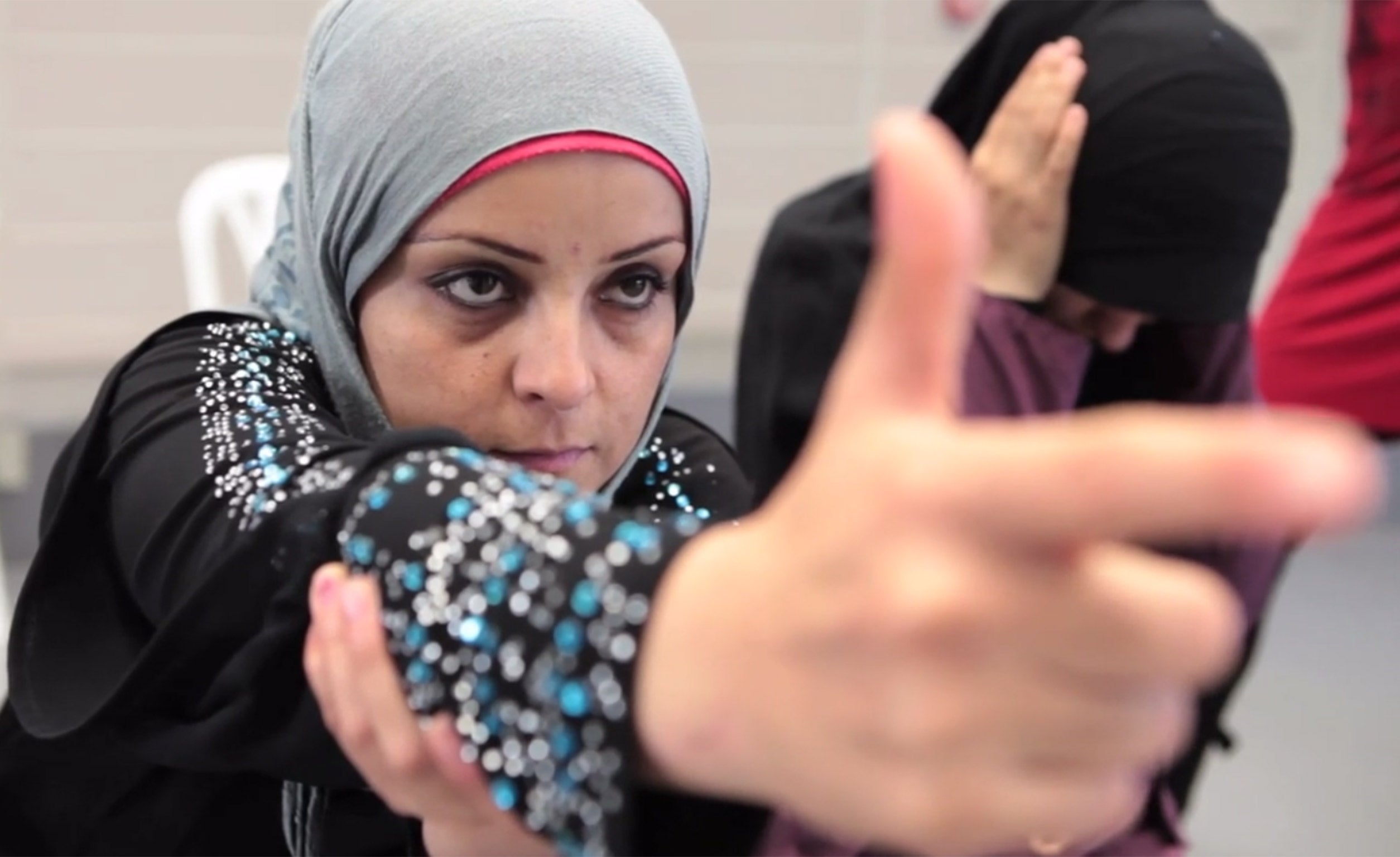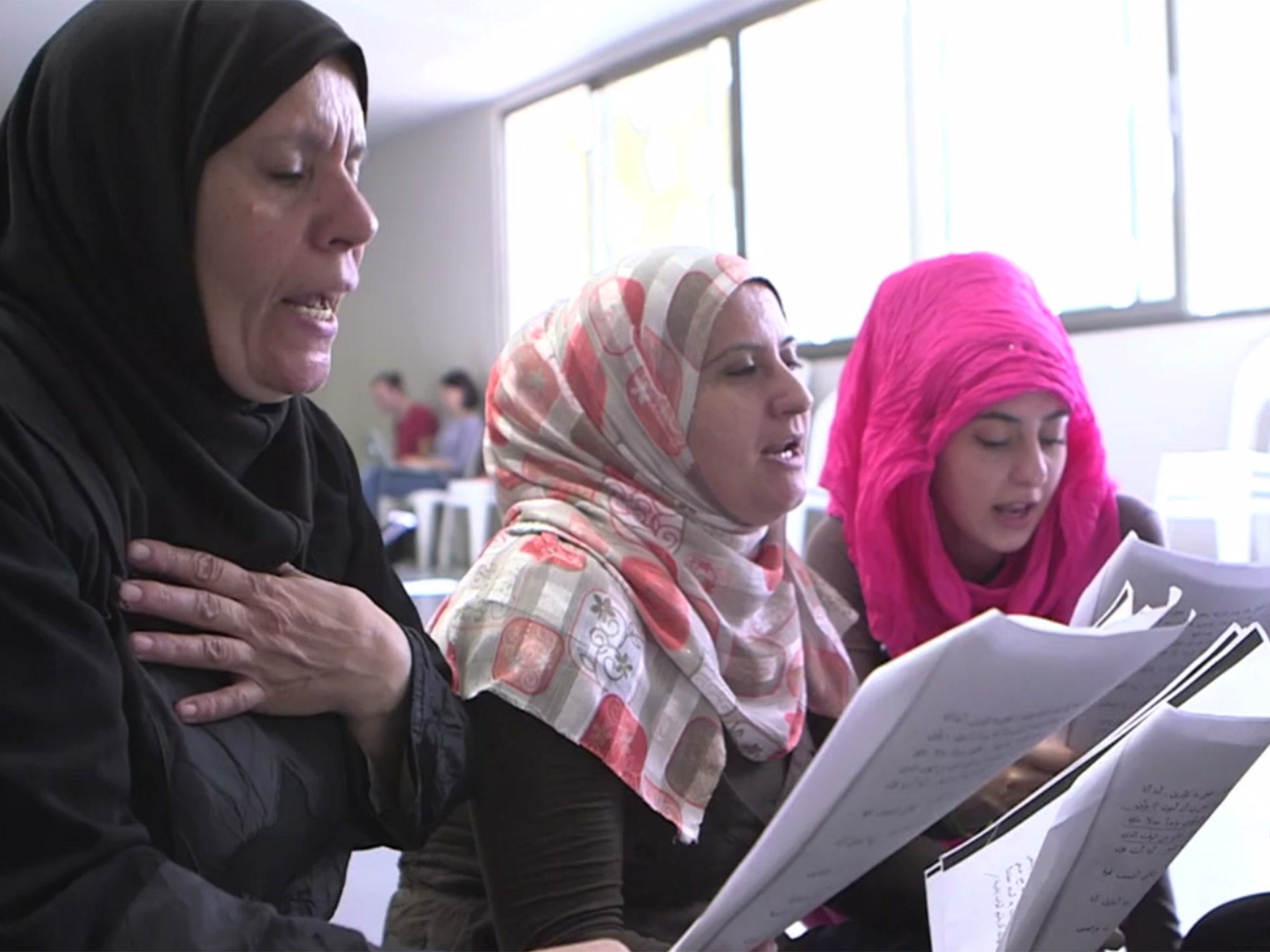Making a drama out of a tragedy: Syrian refugees find catharsis on stage in Lebanon
'Antigone' by Sophocles is a shocking tale of death and defiance. A group of Syrian women, in exile in Lebanon, are performing a modern version of the play that encompasses their own contemporary traumas

Your support helps us to tell the story
Our mission is to deliver unbiased, fact-based reporting that holds power to account and exposes the truth.
Whether $5 or $50, every contribution counts.
Support us to deliver journalism without an agenda.

Louise Thomas
Editor
"Fortunate is the man who has never tasted God's vengeance." In unison the women recite lines from Antigone in a yoga studio in Beirut.
But this is no regular production. The star of Antigone of Syria is not Sophocles’ heroine but the cast, whose personal stories of love, loss and tragedy have been integrated into the 2,500-year-old text.
The 22 women have never seen a play, let along acted in one. They have come a long way from their homes in the refugee camps on the edges of Beirut to the stage of the small Metro Madina theatre, where the show premiered last night.
Initially afraid of their own voices, they have learnt how to be comfortable in their own bodies. During rehearsals a month ago, the group was rowdy during breaks, and had slowly started to share stories. The play has been a therapeutic experience for many.
Just a week before they were set to go on stage, women still wiped away tears during rehearsals, while hearing stories they have heard many times before. “Even if these are individual stories, they speak on our behalf,” explained Rim, a 35-year-old primary school teacher who fled Damascus with her three children to “escape the sounds of bullets”.
The women’s stories form the bulk of the text, woven into the narrative of Antigone’s burial of her brother Polynices, in defiance of her uncle King Creon, the ruler of Thebes. He condemns Antigone to be buried alive. Hiba, one of the women, is a modern version of the woman she will portray on stage. Her voice quivers as she recites her lines, addressing the injustice of her fate. The 23-year-old has lost two brothers. One died while she was in Lebanon, leaving her unable to bury him. She still doesn’t know here his tomb is.
The Syrian/British production company’s choice to perform Antigone wasn’t just the female perspective on civil war, says Mohamed al-Attar, who wrote the text. “It’s also a story of the individual versus the stage, and the individual versus authority.”
Political overtones are never far away, despite the women, who hold differing political views, trying to shy away from politics in the text. Creon is the most polarising figure in the play. “All sympathise with Antigone, but they don’t all identify Creon as a classical tyrant,” says Mr al-Attar. Fadwa, the oldest in the group, was drawn to the role. “Creon was trying to keep the state standing. He had to sacrifice just to make the country stronger. Because he was the captain of the ship, he needs to make strong, harsh decisions for the bigger picture,” she explains of her motivation to embody the character. “I was in a similar position,” she says, referring to when she decided to take her grandchildren to Lebanon, against their mother’s will, after two of her sons died within a year.

For many, conflict with authority can also be found in the family sphere. “Creon can also be a dominant male figure, someone in the family,” explains Mr al-Attar.
Most of the women’s families are supportive of them going on stage, but one has a spouse who is still convinced she is attending a sewing workshop. The group started eight weeks ago with 41 women. Only 22 will appear on stage.
In addition to family adversity, a handful have had to overcome the fact that they cannot read, recording the text on mobile phones and playing it back to learn their lines.
The play offers them a chance to escape traditional female role patterns. Fadwa says she hasn’t felt this young in years. “The past 40 years I have dedicated to my kids, to the life of others, not my own. In this project I have found the space to come back to who I used to be, somebody who loves to speak, to write,” she beams. It’s also an escape from a harsh daily reality. Chatter at rehearsals focuses on the food aid that was cut by the World Food Programme last week due to a lack of funding.
But that makes cultural projects even more important, says Rim. “Because there is lack of basic needs and because that is a huge burden, the time we spend here is the time we can escape and we can share this burden and express some of our pain.”
Like many, she fears the time when the production is over. Organisers hope that the women will be able to keep the project going on their own, and maybe even become trainers for other women. “Most of all, it’s the chance to spend a few hours every day outside of a tough situation,” says Soundous, another cast member.
Subscribe to Independent Premium to bookmark this article
Want to bookmark your favourite articles and stories to read or reference later? Start your Independent Premium subscription today.
Join our commenting forum
Join thought-provoking conversations, follow other Independent readers and see their replies
Comments